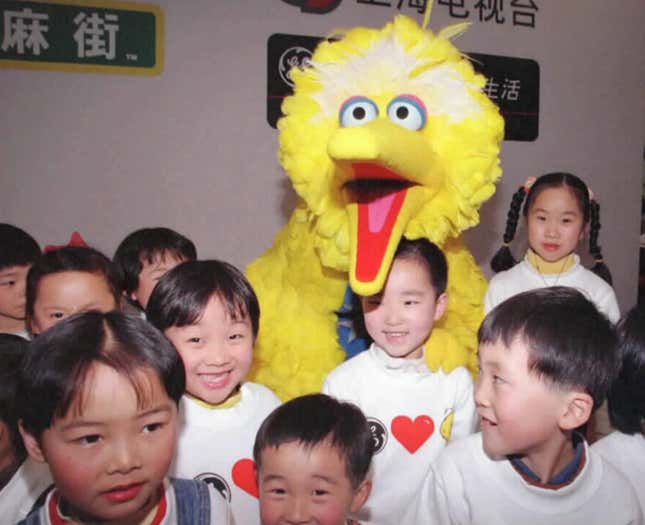When they became parents almost eight years ago, Shanghai-based Liu Jian and Rebecca Kanthor struggled to find quality music to play for their daughter. Down the YouTube rabbit-hole they went, discovering metal, pop, and more—all aimed at kids.
The bands hailed from all over the world, and sang in different languages. An idea was conceived: Fly them to China, and give families a live-music experience they’ve never had.
“I don’t want Chinese kids to have to wait until they’re 16 to hear rock music like I did,” says Liu, a singer. He and Kanthor, an American journalist, already knew why concerts and festivals failed families: bad sound, poor sponsorships, no nursing areas or stroller parking. But how to entertain children and their grandparents at the same time?
To find out, the couple decided to pursue live music events for their own children, and see whether other families responded to the idea.
In 2017, with little money and effectively no business plan, (they say they did zero market research) Liu and Kanthor launched the Hand in Hand International Children’s Music Festival. Since then, they have signed 50 bands and taken them on the road to 21 cities in China, with the goal of expanding to 100.
Risk vs. reward
“It was a total risk and a huge initial investment,” Kanthor says, admitting she and Liu Jian both hit up their parents, siblings, and friends for loans; although that’s not uncommon in China, where one’s professional and personal relationships are often paramount when it comes to financial and logistical support for a new venture.
In its third year, Hand in Hand, the first music festival of its kind, has now joined ranks with the few nimble startups that looks like it may weather the coronavirus storm and come out healthy on the other end.
Going live

This year, the festival’s last stop was Beijing, on a Sunday morning in January, a few weeks before the coronavirus pandemic emptied streets and public spaces. Drums thundered through the Chinese capital’s oldest museum. Kids rushed the stage. Their grandparents danced. An American woman sporting a wall of red hair from a B-52’s video sang in both Mandarin and English.
This was no typical concert. For one, it signaled an unusual intersection of bilingual education and live entertainment in the People’s Republic of China, where Beijing that same week amplified its push to become an “international music capital” by 2025.
The announcement preceded the novel coronavirus and Covid-19 outbreak, which has since forced live-music cancelations throughout China and the world. The pandemic now threatens the concert industry globally as ticketers and promoters scramble to confront their worst losses in history. (South by Southwest and Coachella are just two of the major festival casualties fans initially mourned.)
Well before the pandemic, regulations stifled industry growth in China. Many performers have been banned for offenses such as supporting Hong Kong or Tibet on social media. A photo with the Dalai Lama was enough to get Lady Gaga blacklisted. Katy Perry was banned after she wore a dress decorated with sunflowers, because they signified allegiance with Taiwan.
Child’s play

Until Hand in Hand, children’s music never truly broke through in China. An article in China Women’s Newspaper summarized the reason: “It’s much harder for a children’s song to cover its costs.”
“The music that we bring is not music that is simple or talks down to kids,” Kanthor says. “This is an entire genre of music that’s totally untapped here.”
Indeed, in the children’s music industry as a whole, there’s a fine line between catchy (“Baby Beluga”) and kitschy (“Baby Shark”). Back in the 1960s, the music of Mister Rogers’ Neighborhood and Sesame Street used the visual power of puppets to reach kids through TV. But children’s music as a genre didn’t emerge until the 1970s, pioneered by a handful of Canadian baby boomers: Raffi, Fred Penner, and the trio Sharon, Lois & Bram. Their gentle folk songs helped sell out venues across Canada and the US, where those artists still tour sporadically. “The industry, in the beginning, didn’t realize that money could be made from making music for children,” Penner, the Canadian family-music entertainer, tells Quartz in a phone interview from Vancouver Island, ahead of his now-postponed 40th anniversary tour of the album The Cat Came Back. “So that gave us free rein to get out there and do quality music.”
The legacy of hit family singalongs isn’t limited to catchy choruses. Universal topics—love, compassion, resilience—are what transcend borders and resonate with children around the world, “even if you don’t speak the language,” as Penner adds. “It is more about looking directly at a child and saying ‘How are you?,’ even if they don’t understand what ‘How are you?’ means.”
During the Hand in Hand shows, song lyrics are translated into Mandarin and projected onto screens as the bands perform. Kanthor says the festival should inspire Chinese musicians to create better music for kids, while offering families a rare experience together.
“People in China love music education, and they want their kids to be in music classes,” she adds. To differentiate between children’s musical entertainment, it’s worth noting that children’s music education is has been a thriving industry for years. With Hand in Hand, Liu and Kanthor are trying to create something different. “We thought, wouldn’t it be cool if the parents were taking an active role in it and learning at the same time as their kids? That’s our experiment.”
The China experiment

As in most societies, social media heavily influences Chinese listening habits, with music fans mostly streaming via behemoth platforms like KuGou Music and QQ Music (owned by the world’s biggest music company, China’s Tencent). The challenge, before coronavirus disrupted the industry and most of the world, had been enticing more people to buy tickets to live shows as the concert industry strives to grow aggressively, says Alex Taggart, head of international operations at Outdustry, a China-based music marketing service.
“The live performance market is a little too segregated,” Taggart says. “It’s not necessarily that the demand isn’t there, it’s just that the industry around the artists hasn’t quite taken shape yet. China is notoriously lacking in a sustainable middle class of promoters and venues, which is exacerbated by the fact that there aren’t really many music-specific agents operating in the market.”
Holding together a traveling festival is one thing; taking it on the road throughout the most populated country in the world is another beast. How do you begin to achieve a goal of visiting 100 cities? By starting small, it turns out. In the festival’s earliest days, Hand in Hand introduced bands to overlooked parts of China, towns and villages within rail distance of big cities like Beijing, Shanghai, and Tianjin, where high-speed trains have accelerated outreach to places where many Chinese have never seen a Western musician perform.
When the pandemic drops
Enter the coronavirus pandemic, which is testing the resilience of even the most successful business leaders. Although China reports having contained Covid-19 in most areas, the country recently announced it was suspending entry for foreigners with visas and residency permits. This includes musicians.
Hand in Hand has had to shift attention to new projects. Beyond booking shows, Hand in Hand’s priorities now include publishing and distributing albums on behalf of the artists who perform in its festivals. The focus is on finding new ways to keep families connected and entertained, which takes the form of content production and convincing the bands that a brand presence in China is still worth it. “There’s a future for them in China,” Kanthor says. “More than just the live shows, we also want to put out their music to build a band identity here.”
For the time being, the next festival is postponed. “We haven’t changed our mission at all. In fact, it makes us even more determined to continue,” says Liu. “We focus on what we can do and plan for the future. We know families will really need that outlet when things return to normal.”
